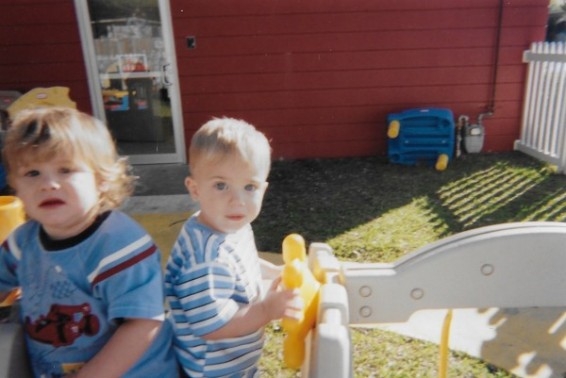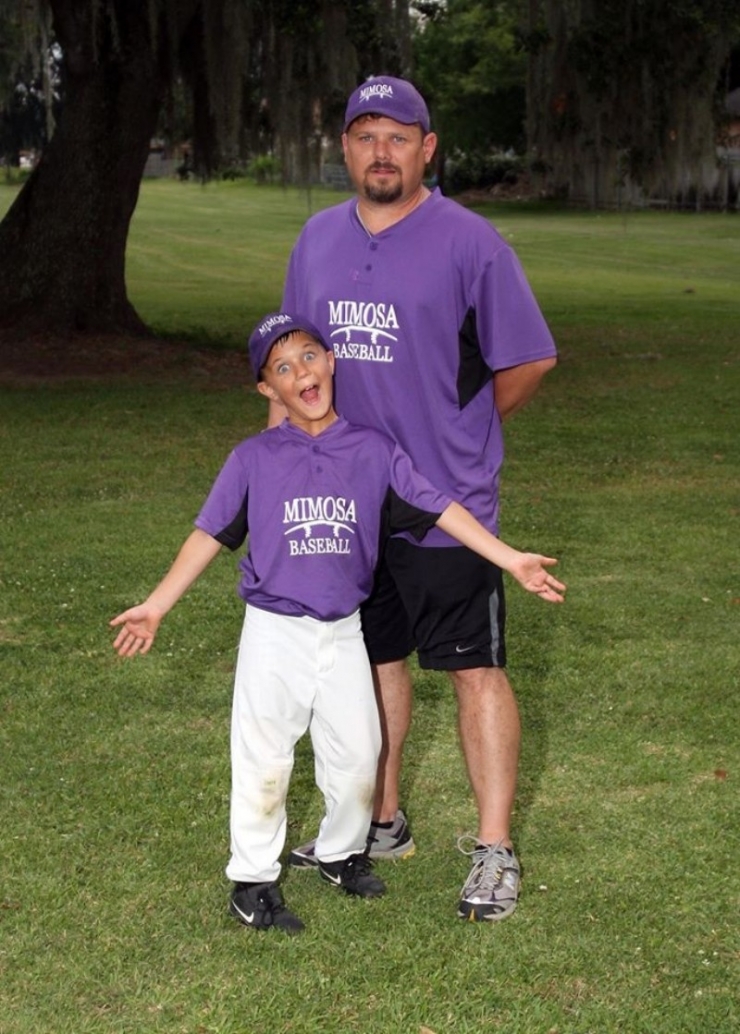Alex also had a special relationship with faith. His parents went to church on Sundays but are self-declared heathens and were surprised, but inspired by, their son’s spirituality. Alex prayed before meals and bedtime. He found something comforting in the bigger picture, in the idea that we have less control in this world than we might think. It’s like he knew something that no one else did.
Things began to happen during Alex’s kindergarten year. First, it was harmless. His teacher suggested that he be checked and medicated for ADHD. Unfortunately, he had adverse reactions to every ADHD medication he tried - stomach pain, headaches, leg pain, agitation. In two years Alex had exhausted every option. Then, his school work started to decline. He couldn’t focus; he grew increasingly agitated, even his handwriting began to look sloppy. Doctors chalked this up to the medications and their side effects.
Next, Alex began vomiting and blacking out. The first time it happened, his parents demanded an MRI, which was denied. Alex was sent home with a flu diagnosis. When it happened again, they knew this was not the flu, and this time they weren’t leaving without a scan. The CAT scan showed swelling in the white matter of Alex’s brain. Although the doctor said there was “nothing normal about Alex’s brain,” a diagnosis couldn’t be determined without a blood test. Doctors predicted it was either ADEM, a curable condition, or ALD, a rare, fatal brain disease. The results would take 2 weeks to come in. Until then, all they could do was wait.
The internet can be very cruel to two parents who are researching the fate of their son. With the click of a mouse they were able to research ALD; they learned that it affects only boys (1 out of 17,000) and causes demyelination of the brain. It removes the protective covering that allows neurons and axons to function. Their eyes widened in horror as they read that when it’s gone, the neurons die, and cannot be replaced.
This is when the boys start to lose functions. This is when it turns into a nightmare.
On May 9, 2012, the Oxfords found out that Alex had ALD, and that they had 1-2 years left with their son. As Carissa put it, “time stopped.” They left crushed, shattered, and desolate. But on the drive home they looked in their backseat, at their beautiful son, and resolved to not let this diagnosis be a death sentence - at least not without a fight.
There were two options: watch while Alex loses his independence until he can no longer regulate his body temperature and dies of organ failure. Or, Alex could have a bone marrow stem cell transplant - a risky operation - but if successful, could give Alex 5-10 more years. It wasn’t a choice for the Oxfords. It was a risk they had to take.
Certain things happen in life without explanation, and why Alex’s first transplant didn’t ‘take’ is one. His cells rejected the healthy ones that were transplanted into his body; his immune system was greatly weakened by the chemo and radiation necessary before the transplant. After much soul searching, the family decided to try once more.
The second transplant, medically speaking, was a success. Alex’s body accepted the new stem cells, and he will live for 5-10 more years in hopes of finding a cure for ALD. But this extra time came with a price. Because of the toll chemo and radiation took on his body, and the time lapse - the time between transplants compounded with the years his ALD was worsening and being misdiagnosed as ADHD - Alex lost many of his functions. He is now blind, deaf, restricted to a wheelchair, and wears a diaper.
As Alex said before the transplants, he knew there “was a chance I might not walk, I might not talk, but at least I’ll be alive.” He and his family decided to fight certain death. They decided to hope.


Growing up with a big family, Alex was always surrounded by siblings. When he chose sports, he was always surrounded by his team. Everything Alex has ever done has been part of a bigger picture. That’s no accident.

Here’s the goofball clowning around with his Dad. For Alex, every moment was an opportunity to laugh and have fun.

His 7th birthday was during the time that Alex was being medicated (and misdiagnosed) for ADHD. He had adverse affects to all the meds because he did not have ADHD, but it is the #1 most common diagnosis to boys who have ALD. What was perceived as high energy, inability to focus, and agitation, were actually symptoms of this merciless disease.

Instead of his handwriting improving with age, Alex’s declined and become sloppy; hurried. This was a clue as to how his brain functions were deteriorating, but was again overlooked.

When Alex did finally get tested, the disease had been allowed to run rampant in his body for years, compounding the symptoms that would soon claim Alex’s body.

In the time before Alex’s first transplant, he and his family made every moment count. They did not know what awaited them on the other side. Alex got to fulfill his dream and meet (and play football with) Drew Brees, he was made the honorary football captain of his local football team, and he visited Disney World.

This guy is a fighter. Just how much he was going to have to fight just to stay alive, he didn't know yet.

When chemo expedited his symptoms and attacked his immune system, he fought. When he became nauseous and got mouth sores and lost his hearing and stopped being able to do the things he loved because he could no longer remember how to, he kept fighting. He stopped at nothing to keep breathing, keep living, and keep fighting off this horrific disease.

Alex and mom Carissa. Few things are stronger than the bond between a mother and her son.

Now Alex and his family try and adjust to their “new normal.” This includes physical therapy and going back to school, which Alex deeply enjoys. However, because of Alex’s specialized wheelchair, he cannot travel in his mom’s van. He has to ride the bus, which presents a period of time that Alex is unsupervised and could have a seizure or need assistance and have no one.
It puts Carissa in a difficult position, because she knows her son wants desperately to be a part of a team again, but to do so she had to accept that she would not be able to keep him safe until he arrived at school. She needed another option. Enter Chive Charities.

Alex needed mobility, but mobility without safety will not help him in any way. This ADA van grants him independece and secures his well-being. The specialized chair, on the right, is built for Alex. It's comfortable but keeps his head elevated enough so if he has a seizure, his posture will not present a safety hazard.

With a $66,000 grant from Chive Fund, Chive Charities supplied Alex with a new Dodge Grand Caravan, which is ADA accessible and has an in-floor conversion. This means Alex can travel wherever he wants, whenever he wants. For when he’s home, we purchased a Comfee specialized seat so he is comfortable and safe.
Apart from being with his family or his team, the only other place Alex feels at home is in church. Before, he would beg his family to attend church with him, but now they attend every week because of him. And every time they go, the strangest thing happens. Alex will roll his head back and angle his face towards the stained glass window, high up above everyone’s heads. He will sit and face the stained glass window, and smile. The entire time.
Alex’s life is not defined by ALD. His life is defined by his heart, his fight, and his faith. He still finds beauty in the simple things. He still seeks out joy. But there is something to be learned from Alex’s journey. At any one point, if someone had diagnosed Alex with ALD before they did, his symptoms would not have been able to progress and take over his body the way they did.
At birth, there is a simple blood test that can diagnose ALD. As of now, it is not one of the diseases that doctors will test for. If parents could find out that their son had ALD at birth, the lives of these little boys would be dramatically different. They would have their abilities and their functions, and be able to live as long as they could with the highest possible quality of life. The test costs $1.50. It is only mandated in 2 states at this time, Tennessee and New York. Carissa is fighting for the other 48. She has secured a meeting with her Senator to encourage Louisiana to be the next state to require this harmless test to stop this fatal disease.
Write to your local Congressman or Congresswoman in Alex’s honor.
Our Chive Charities members are directly responsible for every story we write, every person we help. If you’d like to change the world with us, you can become a member HERE.


























































































